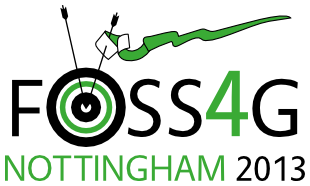Free Workshops
Sept. 19, 2013
W19: Introduction To High Availability Clusters With GeoServer And GeoWebCache
Simone Giannecchini (GeoSolutions S.A.S.)
- 2 p.m. to 4 p.m.
- Location: Sir Clive Granger Building: B29 A
This workshop will provide an introduction to setting up high availability clusters for OGC services using GeoServer and GeoWebCache.
W28: Advanced Spatial Data Analysis With GRASS GIS 7
Luca Delucchi (Fondazione Edmund Mach) with Pietro Zambelli (University of Trento)
- 2 p.m. to 6 p.m.
- Location: Sir Clive Granger Building: B29 B
GRASS GIS is a free Geographic Information System (GIS) used for geospatial data management and analysis, image processing, graphics/maps production, spatial modelling, and visualization which runs on MS Windows, Mac OS X and Linux. This advanced workshop will give a brief overview of the new capabilities implemented in GRASS GIS 7 followed by a hands-on session by the attendees.
W20: SpatioTemporal Data Handling With GeoServer: An Introduction With Examples For MetOc And Remote Sensing Data For WMS And WCS
Simone Giannecchini (GeoSolutions S.A.S.)
- 4 p.m. to 6 p.m.
- Location: Sir Clive Granger Building: B29 A
This workshop will provide detailed information on how to handle SpatioTemporal metadata in GeoServer for serving with OGC Services, with a particular focus on WMS and WCS.
Sept. 20, 2013
W21: Spatial Analysis With QGIS And its Processing Module
Anita Graser (QGIS team, AIT Austrian Institute of Technology) with Paolo Cavallini (QGIS team, Faunalia)
- 9:30 a.m. to 1:30 p.m.
- Location: Sir Clive Granger Building: B29 A
This workshop will introduce the SEXTANTE spatial data framework for QGIS, showing its components and its usage for all kinds of data analysis. A set of example cases will be detailed, which cover common analysis routines, as well as more advanced ones. Note: This workshop requires delegates use their own laptop. Please ensure that QGIS 2.0 is installed from http://new.qgis.org/html/en/site/forusers/download.html prior to attending. Should you experience issues installing QGIS 2.0 please contact Paolo Cavallini (cavallini@faunalia.it)
W24: Implementing Spatial Search Engines
Robert van Seeters (Geodan) with Steven M. Ottens (Geodan Research), Jan Boonen (Geodan)
- 9:30 a.m. to 11:30 a.m.
- Location: Sir Clive Granger Building: B29 B
This workshop is aimed at teaching how to integrate spatial data (e.g. using OGC webservices) with enterprise search solutions. We will cover indexing, searching and presentation of search results to end users. We will work with live geographical datasets (e.g. INSPIRE download services) and combine those with non spatial datasets to provide a seamless search solution for all your data.
W23: WPS With GeoServer
Tom Kunicki (OpenGeo)
- 2 p.m. to 4 p.m.
- Location: Sir Clive Granger Building: B29 A
One area where web-based GIS has traditionally lagged behind its desktop counterpart is in analysis and processing. No more. The Web Processing Service (WPS), modeled on the more widely known Web Map Server (WMS) and Web Feature Server (WFS) protocols, adds support for web-based geospatial analysis.
W27: Keep Your Data And Metadata Synchronized
Francois Prunayre (titellus)
- 2 p.m. to 6 p.m.
- Location: Sir Clive Granger Building: B29 B
Synchronization of geospatial datasets and their metadata is a key point of today's SDI. In this workshop you will learn how data management applications such as Talend ETL could be combined to analyze your data and populate or update your metadata catalog in Geonetwork.
W25: How To Easily Build Your Own GeoNetwork UI Using Widgets
María Arias de Reyna (Geocat bv)
- 4 p.m. to 6 p.m.
- Location: Sir Clive Granger Building: B29 A
First, we will present the new HTML5 UI for GeoNetwork and how to use it (technically speaking). Then we will wander on the following topics: how to customize or create a simple geoNetwork UI using widgets; how to add a widget to a non-geoNetwork webpage; Use CSW/search api to search from an external website using geoNetwork widgets.
Sept. 21, 2013
W22: Big Data in Geo
Peter Baumann (Jacobs University)
- 9:30 a.m. to 1:30 p.m.
- Location: Sir Clive Granger Building: B29 A
Big Geo Data, their characteristics, variations, and new qualities (in particular, temporal aspects) are discussed in this workshop. OGC WCS and further standards will be in the center. Both concepts and their high-performance implementation will be addressed (rasdaman, MapServer, GDAL, etc.). Participants can execute many of the examples shown on their laptop, giving hands-on experience in standards-based access to Big Data. This will enable participants to pursue own research, make informed decisions on standards and tools, and elaborate Big Data solutions. The presenter is editor of the WCS standards and chair of the main Big Data relevant working groups in OGC. His group is contributing the WCS conformance tests and the WCS Core Reference Implementation, rasdaman.
W26: GeoNetwork For Dummies, Or How To Setup And Use An SDI In 3 hours
Jeroen Ticheler (GeoCat BV)
- 9:30 a.m. to 1:30 p.m.
- Location: Sir Clive Granger Building: B29 B
The workshop will focus on the implementation of a GeoNetwork opensource based catalog to serve and access geospatial data in a Spatial Data Infrastructure.
